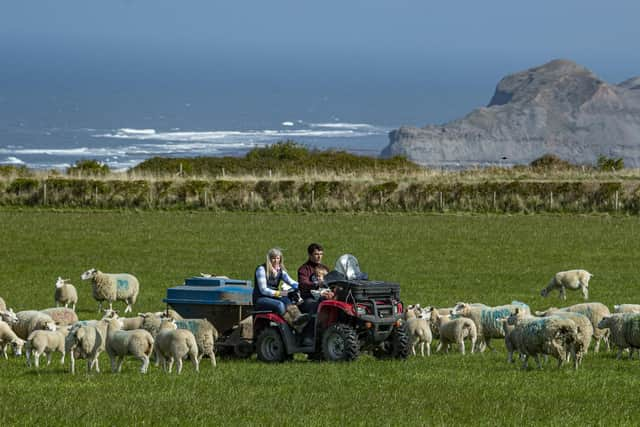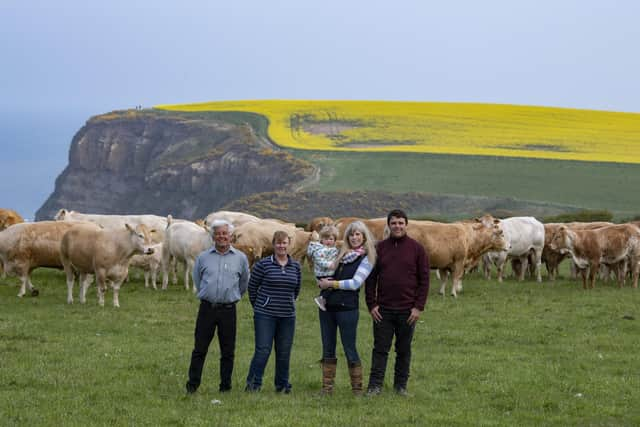Farm of the Week: The seaside farm home to the Cleveland Way and holiday cottages
William Barker and his wife Joanne of Greylands Farm, Hinderwell, currently share the farming load on the 200-acre livestock enterprise with William’s parents Carol and John.
William said that agriculture is changing and Emily their daughter, although understandably not yet able to formulate her ambitions beyond walking and talking, could find herself in a much more female farming environment when she does.
Advertisement
Hide AdAdvertisement
Hide Ad“The farming landscape is changing rapidly. I believe there is going to be even more of a chance for girls in the future. I do think they are better stock people than men and I have first-hand experience of that with my mum and my wife.


“In the coming years there will be as many women farming as men. It’s already happening and I see that as a good thing. By the time Emily is old enough to decide whether it is for her I think the change will have become massive.”
William is the fourth generation to farm at Greylands, his great-grandfather James William having purchased the farm in 1903, but William said he wasn’t one of those farmer’s sons who felt his career was already mapped out at birth to follow the farming line.
“I didn’t have farming down as my career. I’d thought of either becoming a mounted policeman, as I thought I would specialise in an area I was familiar, of riding, if I was to go in the force; or I had even thought of the Army.
Advertisement
Hide AdAdvertisement
Hide Ad“I didn’t go to agricultural college. I went to the college of life. I had worked for a plant hire business for a summer holiday and when I received my first wage packet of over £300 my decision was made.


"I left school and went out to earn a living. There was no chance I was going back to school after the holidays once I’d got used to that.
“I worked away from the farm until I was in my mid-twenties and I still have a job off-farm as a plant operator. I’m currently working at the new mine at Whitby 50 hours a week and then 30 hours a week at least on the farm.”
William said he moved back to being involved with the farm twelve years ago when he and Joanne, a farmer’s daughter from Commondale, first met.
Advertisement
Hide AdAdvertisement
Hide Ad“Joanne and I now have more of a say in running the farm and we’ve tripled our herd number and flock number in that time.
“Joanne also has a day-job as a secretary and those two other incomes have helped considerably in increasing the stock on the farm. We have come on so much from having 12 breeding cows and 43 breeding sheep to today’s 36 cows and 140 ewes.
“It would slow down our progress if I was to leave my digger work behind, although eventually it would be nice to get to the stage where I would only have to do that kind of work when I want.
“The digger work has also allowed us to try things like Australian fencing at the cliff edge where we have two fields, one overlooking Runswick Bay and the other overlooking Port Mulgrave. It is metal fencing that the Australians developed because of problems with termites, but our problem is that traditional post and rail fencing rots with the sea air.”
Advertisement
Hide AdAdvertisement
Hide AdWilliam said that farming at the coast was an eye-opener for Joanne who farmed 10 miles inland.
“The temperature here is always four degrees warmer in the winter, except when you get the ‘Beast from the East’, and four degrees cooler in summer and so overall you get a more consistent all year-round temperature.”
The cattle at Greylands are pedigree Blonde d’Aquitaine and the sheep Texel-cross with most stock sold in Ruswarp and Thirsk livestock markets. William said the Blonde d’Aquitaines were his father’s original acquisition but that he and Joanne have increased and expanded upon and are now in the process of gearing up further.
“Dad started with them 26 years ago when he bought three Blonde cows. His reasoning was that they are easy fleshing, enjoy a grass diet rather than being fed a lot of cake and concentrates and they are docile, making them easy to handle. We’ve bred pure Blondes ever since.
Advertisement
Hide AdAdvertisement
Hide Ad“We are aiming to achieve the highest health status through the Scottish Agricultural College by the end of the year. We know that with just over 200 acres we will never beat anyone on scale but I would like to get to 50 quality breeding cows. I’d love to show them but don’t have the time.”
William may achieve his aim quicker than he might have imagined if his herd prolificacy this year is anything to go by. He has had 38 calves from 36 cows, thanks to two sets of twins.
“We are over 100 per cent. That’s incredible. We’ve never done it before. We aim to keep five or six replacements every year and sell some stock privately, but with the rest going as stores in Ruswarp at between eight to ten months.”
William said he has had recent livestock market success with his three-quarter Texel-cross lambs at Thirsk.
Advertisement
Hide AdAdvertisement
Hide Ad“We put the pure Texel tup to our Texel-cross ewes, buying in 50 replacements a year. We lamb from New Year’s Day and the first lot of 22 fat lambs last week topped the market price per kilo and overall at £166 each, followed by £163 each for the second lot.”
Given its seaside location and with the Cleveland Way running through its fields it is no surprise that Greylands Farm is also home to static caravans, a holiday cottage and touring caravans.
William said the holiday trade went bananas last year. “Everybody came when the Covid restrictions lifted. We had up to 80 tourers on last summer. It’s usually between 30-40. The caravan trade tops us up.”
Comment Guidelines
National World encourages reader discussion on our stories. User feedback, insights and back-and-forth exchanges add a rich layer of context to reporting. Please review our Community Guidelines before commenting.
